There are few clearer cinematic shorthands than using the game of chess to signify intelligence with a bit of sinister manipulation thrown in as well. The Chessmaster is a genius manipulator, controlling the other characters and the action while still being removed from it. Chess is central to this idea because even to the viewer who knows nothing of the game, it is clear that mastery of it requires deep knowledge and an esoteric nature. While the idea that chess immediately equates to superior intellect is debatable this symbolic use of the game goes back centuries. No matter which medium is used, chess is a great way to set up the intellectual capacity of characters, especially when they are both intellectually superior antagonists.
Despite the ubiquity of these tropes, I still absolutely adore seeing them in action. The game carries such history and intrigue that I immediately become more invested than I had been previously. And it is entertaining to see who actually comes out ahead when the game gets going. I particularly love it when a series stretches out the metaphor over multiple episodes or seasons. There are easily hundreds of series, episodes, plots, and characters that revolve around chess. And realistically, I have loved almost every one that I have seen, so I could go on and on. But instead, here are a few of my favorite chess-centric scenes, episodes, and storylines from a few of my favorite series. Feel free to share your additions in the comments!
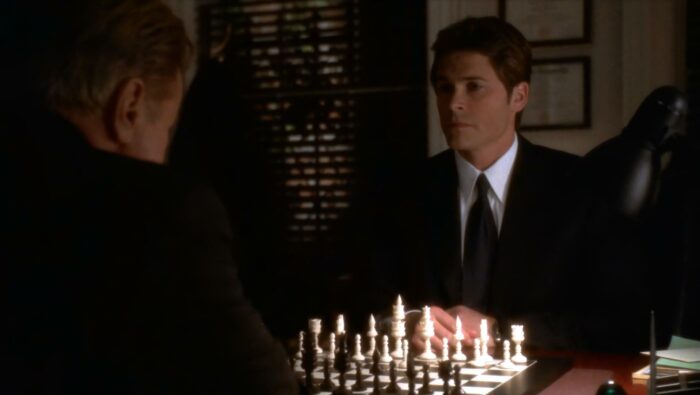
President Bartlet Runs the Gauntlet
(The West Wing S3E14, “Hartsfield Landing”)
Initially, I was going to hold off and put this one near the end of the list, building up to my favorite after discussing the others, but it didn’t feel right. So let’s lead off the list with my absolute favorite series of scenes about the game. President Bartlet’s (Martin Sheen) simultaneous games against Sam Seaborn (Rob Lowe) and Toby Ziegler (Richard Schiff) in “Hartsfield Landing”.
These scenes are so great because they pack so much incredible character work into just a few short minutes. Each game is unique and each conversation, each relationship, is boiled down to its essence. All of the characters on The West Wing are smart but the great thing about the use of chess in these scenes is that the absolute mastery of the game is used to demonstrate just how incredible Jed Bartlet’s mental ability truly is. But it does this with a unique and sinister twist, the game is also the way the others are testing to see if the President’s faculties are failing, so the games and the stakes are even greater.
The two games are also incredible in their ability to show the way the relationships between Sam and the President and between Toby and the President have grown and changed. Sam, with Rob Lowe’s ever-youthful eagerness for attention and affirmation, is pushed to actually show his power. Bartlet’s game with him is gentle, but driven, always pushing Sam to make moves and see the board.
With Toby, as is always the case, the stakes are higher, the attacks are sharper, and the relationship is more tattered. Jed and Toby have a deep relationship, and a central tension in their understanding of each other, that no one else on the series quite has. In these scenes, the chessboard really comes to represent the battle that they each have not only with each other but with themselves. Adding to all of that is the resentment Toby still feels over not being told about Jed’s M.S. and the anger that Jed holds at Toby and himself, and things seem likely to explode throughout. Though it turns out Toby’s frustration with Jed is not hiding his negatives, it is hiding his intelligence. Toby wants the President to embrace his intellect and his power.
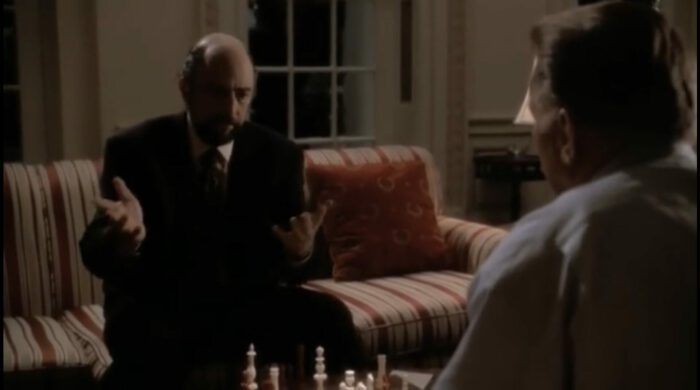
And through the rest of the episode that is exactly what he does. Jed Bartlet clearly still has his full mental capacity and completely dismantles both of his staffers in the games. The scenes completely set the stage for the coming conflicts and the use of the game may never be better served than it is for these particular characters. I mean, who but Jed Bartlet could say he still remembers every position from a chess match he was in the middle of 20 years ago and everyone not only believes it, they realize just how great it is.
D’Angelo’s Chess Lesson
(The Wire S1E2, “The Buys”)
The Wire is widely considered one of the greatest series of all time and that reputation was definitely enhanced through the way the show gave incredible depth and intelligence to all of its characters, no matter what their circumstances. Of course, the sad reality of those same circumstances is always also at the forefront. The characters can never escape their circumstances. And so, in the second episode of the series, D’Angelo Barksdale (Lawrence Gilliard) evokes chess to perfectly encapsulate his crew and the entirety of The Wire.
Bodie (JD Williams) and Wallace (Michael B. Jordan) are waiting for a drug delivery and playing checkers with a chess set when Barksdale sees them and teaches them the rules of the game while making the metaphor to their lives on the street explicit. Also, in this case, the knowledge of the game sets Barksdale apart and instantly elevates his status—before all comes crashing down. All three of these men will wind up as sacrificed pawns in the larger game, all of their moves made in the service of others. Bodie may think he can move ahead, and become something more than a pawn in the game, but The Wire’s world is set. As D’Angelo tells the others in no uncertain terms, “The king stay the king.”
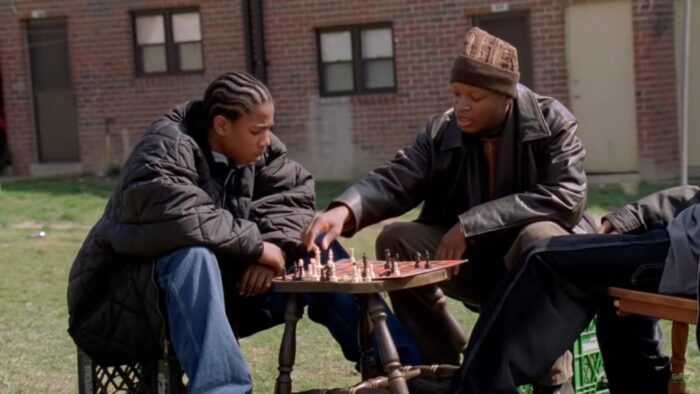
The Doctor Cheats at Chess
(Doctor Who, S26E8 through S26E11 “The Curse of Fenric”)
People sometimes get frustrated when a game, sport, or profession is used in an unrealistic way on a tv show. It is tempting to shout, “that can’t happen” or “those are not the rules” when a series throws in something egregiously inaccurate. So I can totally understand if the use of chess in “The Curse of Fenric” makes you lose your mind, but I still love it.
Despite the incredible nonsense of the “solution” to the chess problem— the pawns from either side have to work together and it is indeed nonsensical— the use of the game to illustrate both the mental capacity and machiavellian manipulation at the heart of the Doctor (Sylvester McCoy) is still incredible. The Doctor shows his true colors as he manipulates Ace (Sophie Aldred) into doing his bidding, puts countless lives at risk, and beats his nemesis, the titular Fenric—who is an ancient evil from the dawn of time, and apparently has never learned the first thing about chess— by clearly cheating at chess. All of this makes it a fantastic serial, and use of the game.
The Doctor vs Mr. Clever
(Doctor Who S7E12, “Nightmare in Silver”)
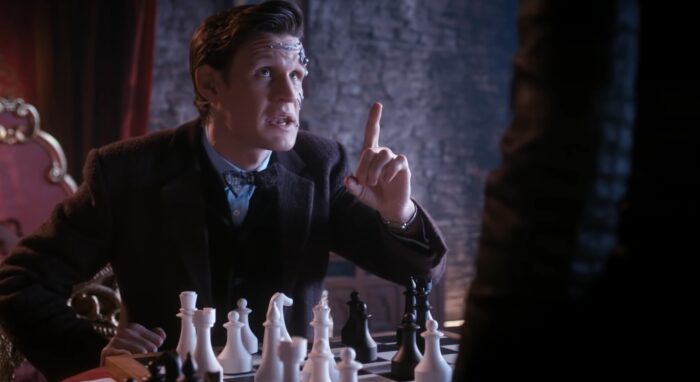
Returning to Doctor Who for his second episode as a writer, the great Neil Gaiman, decided to return to those same themes of manipulation, ancient evil, and the imagery of chess as intellectual power with “Nightmare in Silver”. The key difference this time is that The Doctor (Matt Smith) is now playing both sides of the game as he battles with a Cyberman for control of his own mind.
Smith delivers a fantastic performance and the chess imagery abounds. This time the solution isn’t fundamentally a part of the game (or fundamentally incorrect) like in “The Curse of Fenric” but the giant chessboard and the omnipresent sense that if the Doctor loses, the entire universe will become his own personal chessboard, definitely keeps this episode among my favorite uses of the game.
The DHARMA Initiative vs John Locke
(Lost S3E11, “Enter 77”)
Lost, a series that definitely always wanted to present itself as incredibly intelligent with a long-term strategic plan, of course, had to devote a few key scenes to chess. (Though it is backgammon that got the earliest and most extensive focus, but that is for a different, and much shorter, list.) The most extended, and interesting to me, use of chess though was when John Locke (Terry O’Quinn) had to beat one of the DHARMA initiative computers at the game.
Locke is able to beat the program which is based on moves and positions from real chess matches. Lost is well known for using the names of real-life figures for their character—such as John Locke— but in this case, the cracked mirror to our own world is even broader. Locke has to emulate the moves of great chess masters (one of them being Gary Kasparov at the 1985 World Championship) in order to win the game, just like as a character we have to understand his relationship to the real Locke to unlock his psyche. There is also a great irony to me that DHARMA has to use real-world games to create these chess problems, just like everything else they do, it is an artifice, a created environment for them to run experiments. Not life, but a simulation of it. Just like chess itself developed as a simulation of war.
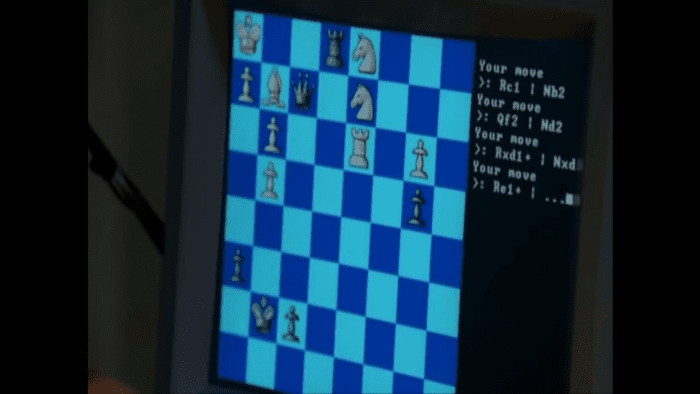
Agent Cooper Gets Help from Pete Martell
(Twin Peaks S2E15, “Slaves and Masters”)
The entire Windom Earle plotline in the second season of Twin Peaks may have revolved around Earle and Cooper in a battle of wits over a chess match, but most of that storyline fell a bit short for me. But the one moment that unquestionably worked was when Agent Cooper (Kyle MacLachlan) decided to go to Pete Martell (Jack Nance) for chess advice. Nance was never less than fantastic on the show, and his play off of Cooper is instantly iconic, and he is greatly missed. At this moment it is Pete with the knowledge and even the way he puts the pieces on the board is iconic. If you don’t know what I mean, watch it!
The Entire The Queen’s Gambit Series
So it should be clear by now, I love chess and I love TV and so The Queen’s Gambit really hit the perfect intersection for me. There are countless things to recommend and scenes of chess playing, chess strategy, and chess sex in the show (yeah, seems right if you have seen it). Beth Harmon (Ana Taylor-Joy) has all of the usual traits of a Chessmaster, but she and the show are also so much more. Every scene in each episode, like every move in a chess match, is careful, and calculated and has to create tension and suspense without leading to disaster.
It is hard to say which of the many many chess scenes, matches, and analogies are my favorites in the series but I will give special mention to the first and the last. The scene when young Beth (Isla Johnston, who like Taylor-Joy is absolutely fantastic in the role) first discovers chess in the basement lair of the school janitor, Mr. Shaibel (Bill Camp). Both Shaibel’s gruff but touching embrace of the young student and her idiosyncratic connection to the symmetry of the game are immediately apparent and electric.
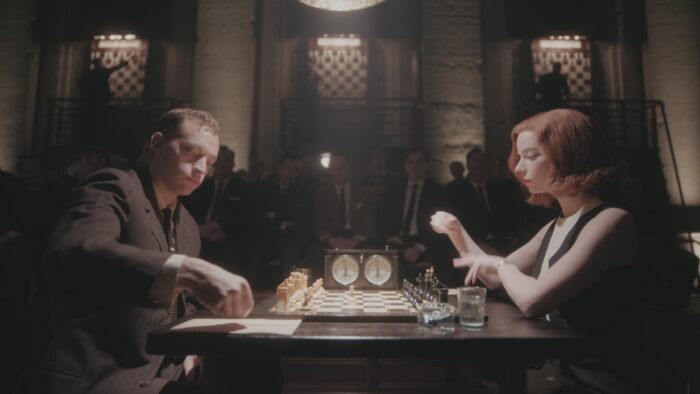
Then there is the final chess scene, the world championship in Russia where the adult Beth Harmon, in a whirlwind of fame and self-destruction, finally defeats her nemesis and thematic opposite Vasily Borgoff (Marcin Dorociński). The scenes depicting their match are a perfect balance of opulent production design, immaculate costuming, and incredible pacing. In the end, Beth is the champion but the show still leaves you wanting more of the beautifully cerebral game.

